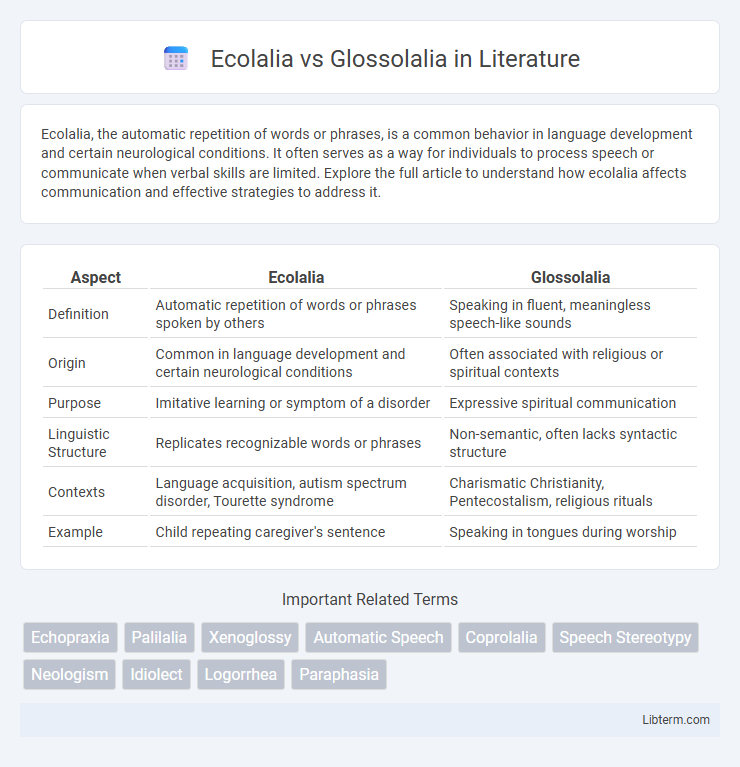Ecolalia, the automatic repetition of words or phrases, is a common behavior in language development and certain neurological conditions. It often serves as a way for individuals to process speech or communicate when verbal skills are limited. Explore the full article to understand how ecolalia affects communication and effective strategies to address it.
Table of Comparison
| Aspect | Ecolalia | Glossolalia |
|---|---|---|
| Definition | Automatic repetition of words or phrases spoken by others | Speaking in fluent, meaningless speech-like sounds |
| Origin | Common in language development and certain neurological conditions | Often associated with religious or spiritual contexts |
| Purpose | Imitative learning or symptom of a disorder | Expressive spiritual communication |
| Linguistic Structure | Replicates recognizable words or phrases | Non-semantic, often lacks syntactic structure |
| Contexts | Language acquisition, autism spectrum disorder, Tourette syndrome | Charismatic Christianity, Pentecostalism, religious rituals |
| Example | Child repeating caregiver's sentence | Speaking in tongues during worship |
Understanding Ecolalia: Definition and Types
Ecolalia is the involuntary repetition of words or phrases heard from others, often seen in developmental disorders such as autism spectrum disorder (ASD). It is classified into immediate echolalia, where repetition occurs right after hearing the phrase, and delayed echolalia, where the repetition happens after a time lapse, sometimes used as a communicative strategy. Understanding these types helps differentiate echolalia from other speech phenomena like glossolalia, which involves fluent, non-meaningful speech without recognizable words.
Glossolalia Explained: Key Features and Characteristics
Glossolalia, often referred to as "speaking in tongues," is characterized by fluent, speech-like but unintelligible vocalizations typically occurring in religious or spiritual contexts. Key features include spontaneous, rhythmical utterances lacking syntactic structure or specific semantic meaning, often perceived as a form of divine communication. In contrast to echolalia, which involves the repetitive imitation of heard words or phrases, glossolalia is generated internally and holds significant emotional and psychological significance for practitioners.
Neurological Basis of Ecolalia
Echolalia is the involuntary repetition of words or phrases spoken by others, commonly observed in neurodevelopmental disorders like autism spectrum disorder and conditions affecting the frontal and temporal lobes. The neurological basis of echolalia involves atypical activation patterns in the mirror neuron system and disrupted connectivity between Broca's area and Wernicke's area, affecting language processing and production. In contrast, glossolalia, or "speaking in tongues," is a voluntary, trance-like speech phenomenon with less defined neurological correlates, often linked to altered states of consciousness rather than specific language circuitry dysfunction.
Glossolalia in Religious and Cultural Contexts
Glossolalia, often referred to as "speaking in tongues," is a phenomenon in many religious traditions where individuals vocalize fluent but unintelligible speech believed to be a spiritual language directed by a divine entity. It is prevalent in Pentecostal and Charismatic Christian movements, where it signifies the presence of the Holy Spirit and enhances communal worship experiences. Glossolalia serves as a cultural marker, reinforcing group identity and conveying spiritual ecstasy beyond conventional language structures.
Clinical Associations: Ecolalia in Autism and Other Disorders
Echolalia is a common clinical feature in autism spectrum disorder (ASD), characterized by the repetitive imitation of spoken words or phrases, often serving as a developmental step in language acquisition or a communicative strategy. It also appears in neurological conditions such as Tourette syndrome, schizophrenia, and aphasia, reflecting underlying impairments in speech and cognitive processing. Glossolalia, by contrast, involves fluent vocalizations of nonsensical syllables without semantic meaning, typically occurring in religious or trance states and not directly linked to neurodevelopmental or psychiatric disorders.
Psychological Perspectives on Glossolalia
Glossolalia, often studied within psychological frameworks, is characterized by involuntary vocalizations resembling speech but lacking semantic meaning, distinguishing it from echolalia, which involves the repetition of actual words or phrases. Research suggests glossolalia may function as a coping mechanism to reduce stress, enhance emotional expression, and facilitate social bonding in religious or ritualistic contexts. Neuroimaging studies indicate altered brain activity during glossolalia, highlighting dissociative states and reduced executive control, contrasting with the more automatic language repetition seen in echolalia.
Differences Between Ecolalia and Glossolalia
Echolalia involves the involuntary repetition of words or phrases spoken by others, often observed in individuals with autism or certain neurological conditions. Glossolalia, commonly known as speaking in tongues, consists of fluent vocalizations without recognizable semantic content, typically occurring in religious or spiritual contexts. While echolalia reflects a response to speech stimuli with preserved phonetic structure, glossolalia features spontaneous, non-meaningful speech-like sounds.
Communication Functions of Ecolalia and Glossolalia
Ecolalia functions as a communicative tool primarily observed in individuals with autism spectrum disorder or neurodevelopmental conditions, serving purposes such as requesting, affirming, or self-soothing through repetition of heard phrases. Glossolalia involves producing fluent yet meaningless speech sounds during religious or spiritual experiences, aiming to express transcendent emotions or facilitate a perceived connection with the divine rather than conveying conventional semantic content. Differentiating both, ecolalia conveys communicative intent through repetition of recognizable language, whereas glossolalia emphasizes emotional expression without direct referential meaning.
Therapeutic Approaches for Ecolalia
Echolalia, often observed in autism spectrum disorder, involves the immediate or delayed repetition of words or phrases and is addressed through behavioral therapies such as Applied Behavior Analysis (ABA) and speech-language therapy techniques tailored to improve functional communication. Therapeutic approaches emphasize functional communication training (FCT) to replace echolalic speech with meaningful language and use modeling, scripting, and social stories to enhance spontaneous language use. Contrastingly, glossolalia, characterized by fluent but nonsensical speech, lacks targeted therapeutic interventions due to its different linguistic and neurological basis.
Societal Perceptions and Misconceptions
Ecolalia, often seen in neurodevelopmental contexts such as autism spectrum disorder, is characterized by the repetitive imitation of words or phrases, frequently misunderstood as mere echolalia or lack of communication skills. Glossolalia, commonly known as speaking in tongues within religious practices, is perceived by some societies as a spiritual or mystical phenomenon, while others view it as nonsensical or psychotic speech. Misconceptions blur the distinctions between these forms of speech, influencing social attitudes and sometimes leading to stigmatization or misdiagnosis.
Ecolalia Infographic

 libterm.com
libterm.com